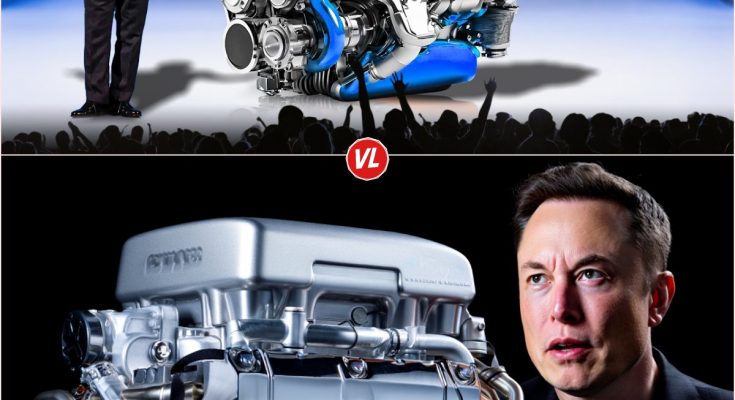Toyota CEO Sh0cks The World After They Announce New Engine That Could Destroy The Entire Electric Vehicle Industry!
Detail in The Comments ![]()
![]()
For years, the global automotive market has raced full throttle toward electric vehicles (EVs), driven by the narrative that battery-powered electric cars are the inevitable future of transportation. However, Toyota, a legendary automaker known for its innovative leaps and long-term vision, has recently stunned the industry with a groundbreaking announcement that could change everything. Akio Toyoda, Toyota’s charismatic CEO, has boldly declared that Toyota’s latest hydrogen-powered engine will not only compete with but potentially “destroy” the entire electric vehicle market.
Toyota CEO Sh0cks The World After They Announce New Engine That Could Destroy The Entire Electric Vehicle Industry!
For years, the global automotive market has raced full throttle toward electric vehicles (EVs), driven by the narrative that battery-powered electric cars are the inevitable future of transportation. However, Toyota, a legendary automaker known for its innovative leaps and long-term vision, has recently stunned the industry with a groundbreaking announcement that could change everything. Akio Toyoda, Toyota’s charismatic CEO, has boldly declared that Toyota’s latest hydrogen-powered engine will not only compete with but potentially “destroy” the entire electric vehicle market.
This provocative statement has sent ripples through the auto industry, igniting heated discussions about the future of automotive technology. Is Toyota bluffing, or are we witnessing the emergence of a game-changing innovation?
The Bold Declaration: Toyota’s Shift to Hydrogen Engines

During a recent automotive technology summit, Toyota’s CEO Akio Toyoda dropped a statement that was impossible to ignore:
“Our new hydrogen-powered engine will completely revolutionize the automotive industry. It will render the entire EV market obsolete.”
The claim is as audacious as it is intriguing. While most car manufacturers have heavily invested billions of dollars into battery-powered vehicles, Toyota has taken a starkly different path—choosing to invest significantly in hydrogen combustion and hydrogen fuel cell technology.
But what exactly is hydrogen-powered technology, and how could it challenge the dominance of EVs?
Understanding Hydrogen Power: Clean Energy Meets Combustion
To truly understand Toyota’s bold vision, we must first comprehend how hydrogen-powered engines operate. Hydrogen, the most abundant element in the universe, possesses unique properties that could make it the ideal sustainable fuel.
In a hydrogen fuel cell vehicle, hydrogen gas stored in pressurized tanks combines with oxygen from the air inside the fuel cell stack. Through this chemical reaction, electricity is generated to power the electric motor, emitting only water vapor as a byproduct. No harmful emissions, no pollutants—just clean energy.
But Toyota isn’t stopping there. They have introduced an additional revolutionary approach: hydrogen combustion engines. Rather than converting hydrogen into electricity through fuel cells, Toyota’s latest breakthrough involves directly burning hydrogen in an internal combustion engine (ICE). This approach significantly reduces harmful emissions compared to traditional gasoline engines, releasing predominantly water vapor and minimal nitrogen oxides, which can be further reduced through catalytic converters and advanced exhaust treatment.
Toyota’s Secret Project: Why Hydrogen Combustion Could Change Everything
Toyota’s hydrogen combustion project has been developed quietly, away from the limelight, within their highly secured research and development facilities. It wasn’t until recently that details emerged, causing significant buzz within industry circles.
So, why is Toyota betting so big on hydrogen combustion engines instead of fully embracing battery-powered EVs?
1. Rapid Refueling Times:
One of the biggest challenges facing electric vehicles is charging speed. Even with advancements, charging an EV takes considerably longer than refueling a gasoline-powered car. Hydrogen-powered vehicles, however, offer the same convenience and speed as traditional gasoline cars. Refueling takes approximately three to five minutes, comparable to filling up at a gas station, eliminating “range anxiety.”
2. Superior Driving Range:
Hydrogen vehicles can cover longer distances on a single tank than most electric vehicles can on a single charge. While many modern EVs offer around 250 to 400 miles per charge, hydrogen-powered vehicles can often exceed this range comfortably. Toyota’s latest technology is reportedly pushing these boundaries even further, making long-distance travel more practical and accessible.
3. Infrastructure & Practicality:
Although the current hydrogen refueling infrastructure is limited compared to EV charging stations, Toyota’s vision includes rapid expansion and robust support networks globally. With strategic partnerships and government incentives, the infrastructure gap could narrow significantly within the next few years, positioning hydrogen as a practical alternative to battery electric vehicles.
4. Environmental Benefits:
Hydrogen combustion engines, when powered by green hydrogen (produced using renewable energy sources like solar and wind power), are effectively carbon-neutral. The only significant emission is water vapor. Unlike battery EVs, hydrogen vehicles avoid concerns related to battery production, including the extraction of rare-earth metals, potential environmental degradation, and issues surrounding battery disposal and recycling.
Industry Impact: Can Toyota Actually Shift the Paradigm?

Automotive experts are split on Toyota’s bold claims. Some see this as the classic strategy of a company that has historically succeeded by bucking trends. Remember, Toyota’s Prius introduced hybrid technology to the mass market at a time when skeptics abounded, yet it became one of the best-selling hybrids globally.
Yet, the scale of Toyota’s current ambition is unprecedented. Could hydrogen combustion genuinely displace battery-powered electric cars?
Automotive analysts highlight several key factors:
Cost-Effectiveness:
Initially, hydrogen vehicles are more expensive due to complex storage tanks and fuel cell stacks. However, economies of scale, technology improvements, and mass production could substantially reduce costs over time.
Government Policy:
Government subsidies and incentives could play a crucial role. With the European Union, Japan, and even the U.S. investing heavily in green hydrogen infrastructure, supportive legislation could expedite hydrogen’s adoption.
Consumer Acceptance:
Ultimately, widespread consumer adoption requires education, practical infrastructure, affordability, and reliable vehicle performance. If Toyota can deliver on these aspects, hydrogen vehicles could see rapid acceptance.
Hydrogen vs. EVs: A Realistic Comparison

